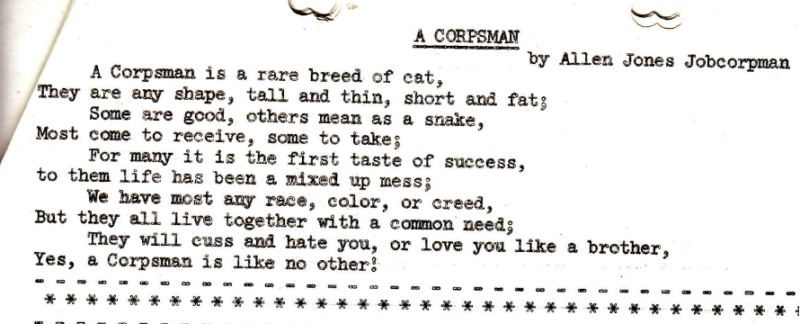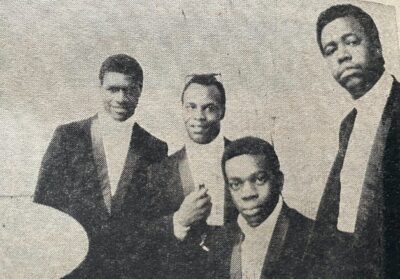NCPH Award Q&A – Acadia Job Corps Conservation Center (AJCCC) in Maine’s Acadia National Park, Part I
08 March 2023 – Laura Miller and Angela Sirna
Editor’s Note: Want to learn more about the Acadia Job Corps Conservation Center in Maine’s Acadia National Park? We sat down with Laura Miller and Angela Sirna and learned about his program’s impact on the community and individual corpsmen. This post is part of a series of reflections from winners of the NCPH awards in 2022.
Editors: Tell us a little bit about the project you submitted for the 2022 NCPH Consulting Award. What is the subject matter? Why is it important?
Our Historic Resource Study focuses on the history of the Acadia Job Corps Conservation Center (AJCCC) in Maine’s Acadia National Park, which operated from 1966 to 1969. The Job Corps was a War on Poverty program that sought to improve the job prospects of poor young people through education and work training. Conservation centers like Acadia’s were modeled after the New Deal Civilian Conservation Corps. One of the things that makes studying these centers so interesting–and valuable–was that they were racially integrated shortly after the Civil Rights Act of 1964. There were nine Job Centers in eight national parks between 1965 and 1969. The Job Corps still operates today but in a different form. Only three of the original nine National Park Service (NPS) Job Corps Centers remain open.
Editors: For our readers who are unfamiliar with NPS Historic Resource Studies, can you explain what they are?
Typically, a Historic Resource Study is a park-wide document that establishes historic contexts, identifies historic properties, and makes recommendations for National Register documentation. This study is a bit different in that it focuses on one historical period, and we did not find any properties that would be eligible for the National Register.
Editors: Angela, how did you get involved with this project?
I was contacted by Gail Gladstone, the park’s Cultural Resource Program Manager when the project was funded. She knew I researched the Job Corps while I was a graduate student at Middle Tennessee State University. I wanted to contribute to this project so I could write a national context on the NPS involvement in the Job Corps that had been swirling around in my brain for a long time. By national context, I mean situating the Job Corps in the history of the War on Poverty and the Job Corps program more broadly (which was not limited to the NPS). I also wanted to put the Acadia Job Corps in context with the larger NPS Job Corps program and the history of the bureau itself.
Editors: Laura, how did you come to work on this project as a consultant?
Laura: Angie reached out to me to see if I might be interested in being the principal investigator for the project. At that point I had been a historical consultant for almost two years; I had built up a network of contacts within public history and NPS circles, I had experience writing NPS histories, and the project was a great fit for my research interests and expertise.
NPS consulting projects are often run through cooperative agreements with organizations like the Association for the Study of African American Life and History (ASALH), the Organization of American Historians (OAH), and the National Council on Public History (NCPH). NCPH advertises requests for proposals (RFPs) for NPS projects on its website. ASALH was the NPS’s cooperative partner for this project.
Angela: I love connecting researchers to parks–what I look for are folks who have good track records of completing similar projects and the requisite subject matter expertise. When I’m unable to find a researcher, I’ve put out calls for proposals through our cooperating partners and have connected with great researchers that way.

A poem written by AJCCC corpsman Allen Jones in The Corpsman’s Corner newsletter, February 13, 1967. Original document in RG 79, Box 29, Folder “Acadia – Publications & Publicity,” National Archives at College Park, Maryland. The transcription linked here and here.
Editors: Tell us about the primary sources you used for this study. Are there any particularly memorable archival or fieldwork finds or epiphanies you’d like to share?
Records of the Job Corps, both at the federal level and for individual conservation centers, contain few details about individual corpsmen. The AJCCC’s records focused largely on their work in the aggregate: the hours corpsmen contributed to park and community projects, how many picnic tables they constructed, or how many acres of brush they cleared. We spent hours trying (unsuccessfully) to locate former corpsmen for oral history interviews to help correct this imbalance. It was a frustrating and humbling experience.
We thankfully did have one corpsman interview to draw on. In 2018, Gail Gladstone and Acadia Curator Marie Yarborough interviewed a former Acadia corpsman named Phil Ranger. Ranger, a White man from Southern California, was sixteen years old when he joined the Job Corps. He described feeling tremendous shock and disorientation at Maine’s harsh climate when he arrived at the Center (“I’m looking around and I see nothing but snow, cold. It was like being off the end of the earth.”) He shared insights into the racial tensions between Acadia’s corpsmen, and local residents’ suspicions about Black and Latino corpsmen in Bar Harbor. He also spoke of the tremendous pride he felt about the work corpsmen did for the local community. Ranger passed away in 2019, and we are grateful that Gail and Marie were able to interview him. His interview provided us with several invaluable details about corpsman life at the AJCCC.
In the absence of oral history interviews with corpsmen, we dug into the limited sources that featured corpsmen in their own voices. The AJCCC’s newsletter, the Corpsmen’s Corner, was invaluable. Corpsmen wrote poems and personal essays, shared gossip, and evaluated their experiences at the AJCCC. We also utilized interviews with soul musician and former Acadia corpsman Charles Bradley. Bradley talked about his time in the Job Corps in nearly every press interview he gave before he passed away in 2017, and that gave us a window into the life of a corpsman who really valued his Job Corps experience.

Photo of the Soul Brothers, a musical group formed by AJCCC corpsmen. Left to right: Ronald Moody, Curtis Hudson, Kenneth Rhymer, and Aubrey Milligan. Bar Harbor Times, April 4, 1968.
Editors: Can you talk about how the pandemic affected working on the project, especially regarding collaboration? What plans were shifted because of restrictions?
Laura: Most of this project was done during the height of the pandemic, when it was not safe to travel, and most archives were closed. Luckily, Angie and I had conducted relevant research at the National Archives pre-pandemic. We relied on Gail and Marie to help us with on-the-ground inquiries with local archives, and Marie scanned all of Acadia’s Job Corps-related documents for us. This project wouldn’t have been possible without their efforts. They were very invested in it. They knew that this was an important but overlooked part of Acadia’s history.
Part II will be published next week.
~Laura Miller is a public historian and historical consultant based in Western Massachusetts. She specializes in research, writing, and oral history projects for history organizations and other nonprofits. She has worked on several consulting projects for the National Park Service, and is currently writing an administrative history of Eisenhower National Historic Site in Gettysburg, Pennsylvania. Miller earned her Ph.D. in History and M.A. in Public History from the University of Massachusetts Amherst.
~Angela Sirna leads the Park History Program for the National Park Service legacy Intermountain Region. Her research interests lie in the intersection of social policy with public lands management. She has a M.A. in history from West Virginia University and a Ph.D. in public history from Middle Tennessee State University. She has worked in national parks in the National Capital Area, the NPS Southeast Regional Office, and as a consultant specializing in park administrative histories.




Laura – my dad was site manager at Eisenhower from around 1995ish or so until his retirement in 2001. If he’s someone who you’d like to approach for your admin history, let me know and I’ll put you in touch with him.